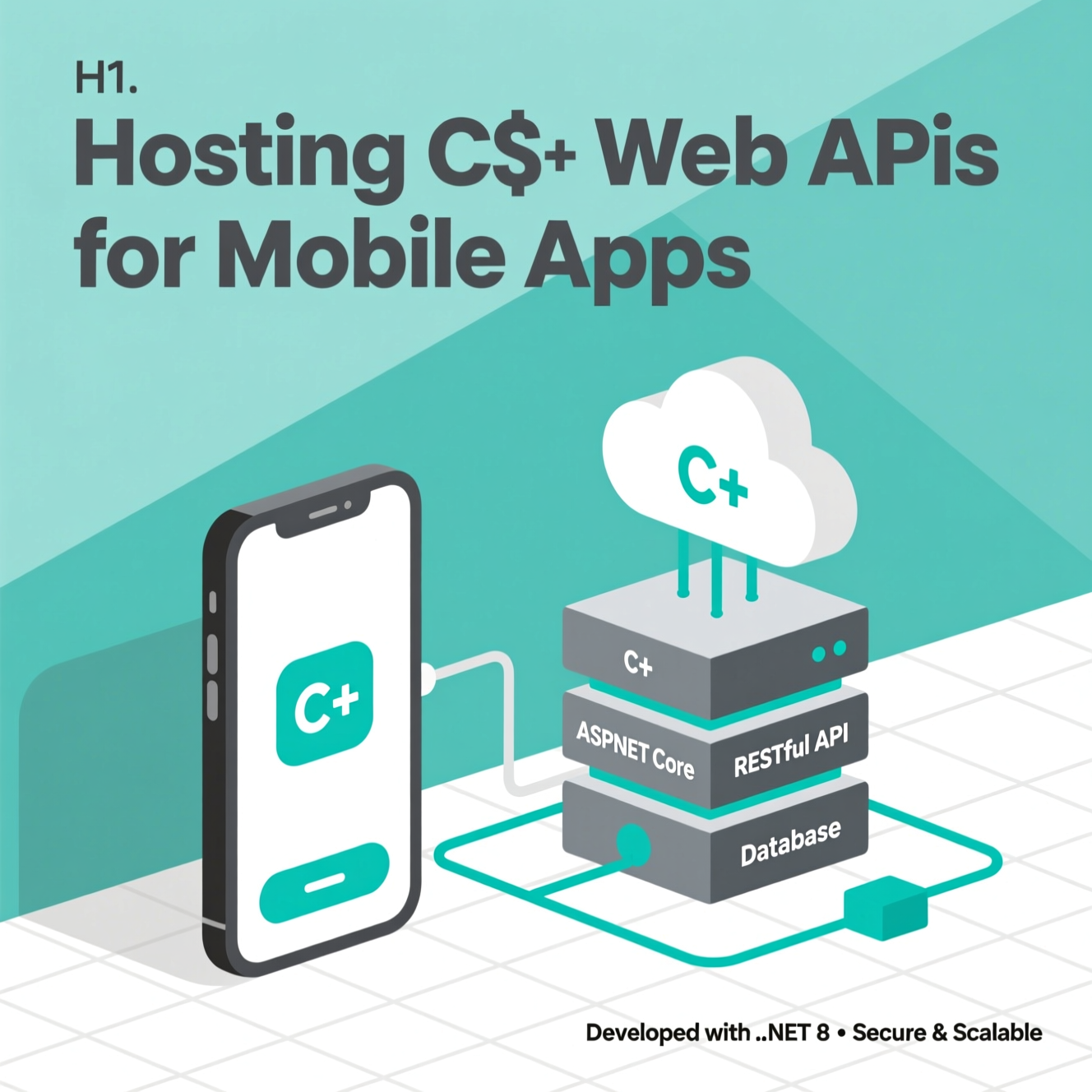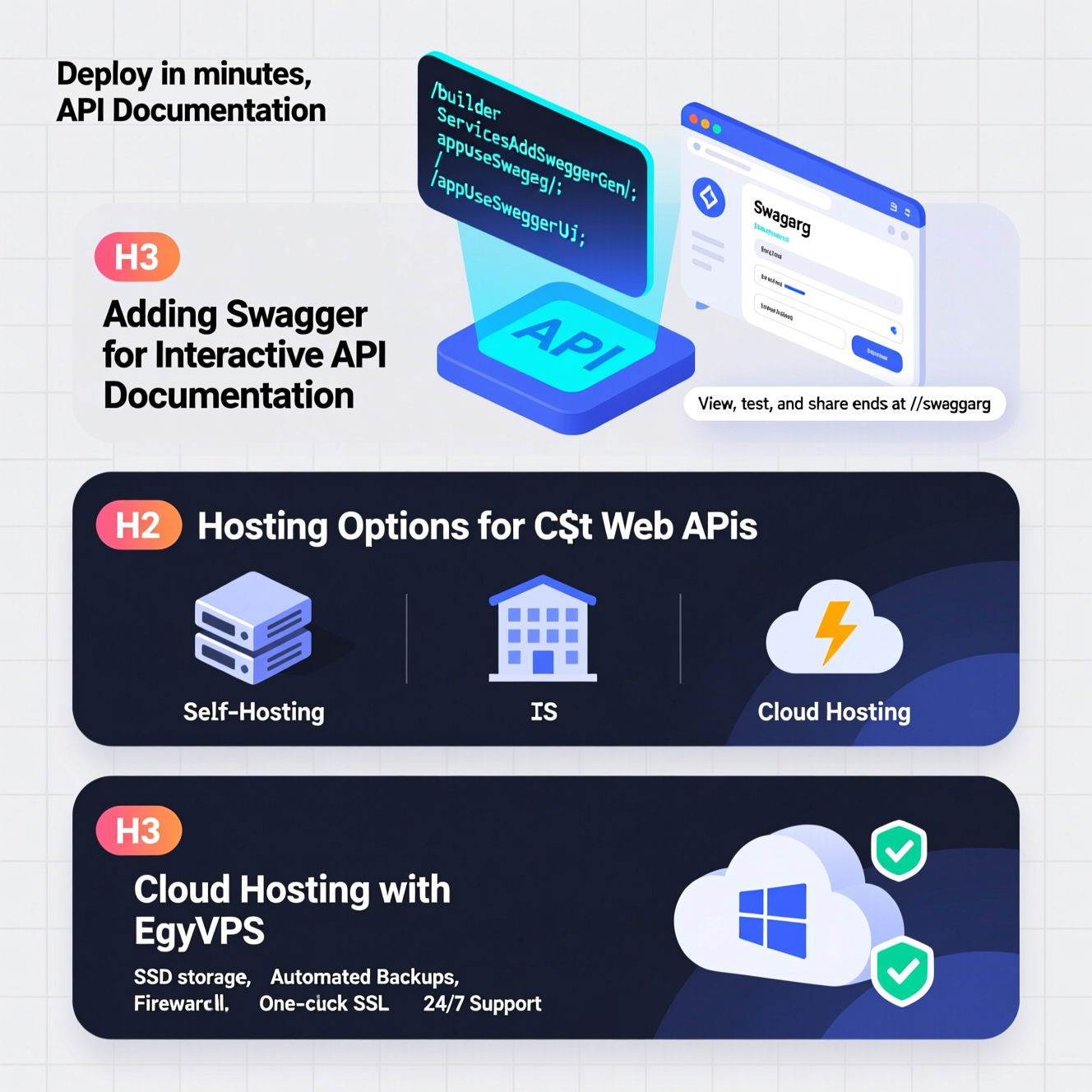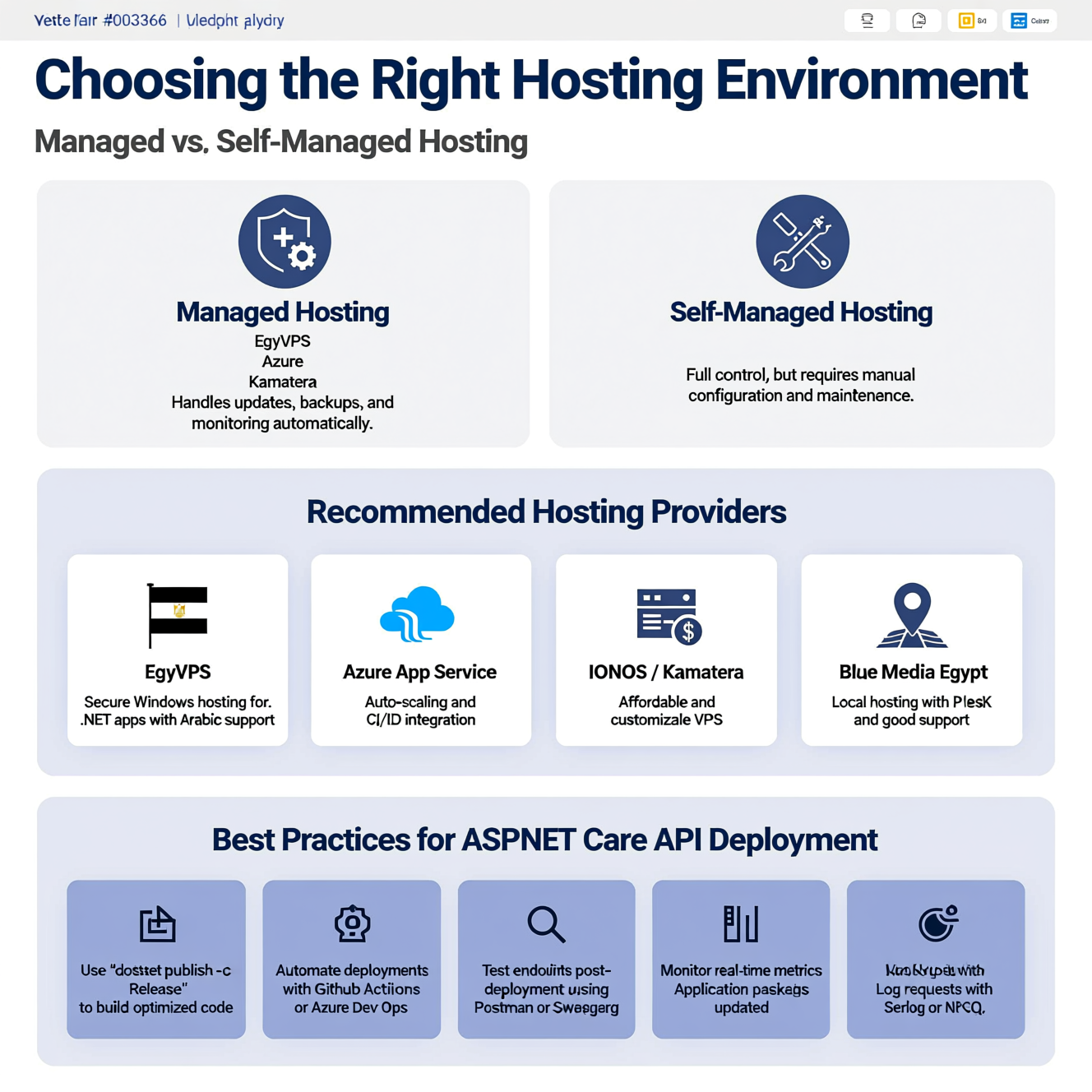In the modern digital ecosystem, Web APIs have become the backbone of connectivity between mobile applications and web servers.
They enable seamless communication, real-time data exchange, and business logic integration across multiple platforms.
If you’re a developer using C# and ASP.NET Core, understanding how to build, host, and secure your Web API is the foundation of delivering a scalable and reliable mobile experience.
This guide explains how to publish, manage, and optimize your C# Web APIs using EgyVPS Windows Cloud Hosting, ensuring top-notch performance and security.

ASP.NET Core is a powerful, cross-platform, open-source framework for creating RESTful APIs.
It’s lightweight, modular, and designed for high performance — making it perfect for powering mobile backends.
To begin building your C# Web API:
Open Visual Studio and choose Create a new project.
Select ASP.NET Core Web API as the template.
Name your project and choose the appropriate .NET version.
Add controllers (like WeatherForecastController) to handle requests and responses.
Test your endpoints locally using Kestrel or Swagger UI.
Example endpoint:
This simple API returns product data that a mobile app can consume instantly.
A well-documented API saves hours of integration effort.
Install Swashbuckle.AspNetCore from NuGet, then configure it inside Program.cs:
Now you can view, test, and share your API endpoints easily from /swagger.
Once your API is running locally, it’s time to make it accessible to mobile clients around the world.
There are three primary hosting options: Self-Hosting, IIS Hosting, and Cloud Hosting.
If you want full control and minimal dependencies:
Install Microsoft.AspNet.WebApi.OwinSelfHost.
Configure your base URL and start the server programmatically.
This is great for testing or small internal services, but not ideal for production due to limited scalability.
For enterprise-grade environments, IIS is the most stable solution.
Steps:
In Visual Studio → click Publish → IIS.
Choose your publish folder and deploy it.
On the server, open IIS Manager, add a new site, and map it to the published folder.
Assign an Application Pool with the correct .NET version.
Install .NET Core Hosting Bundle if needed.
When performance, uptime, and security matter — EgyVPS Windows Cloud Hosting is your best choice.
Their servers are optimized for ASP.NET Core, with built-in:
SSD storage for faster load times
Automated backups
Integrated firewall and malware protection
One-click SSL setup
24/7 technical support
You can deploy your API in minutes and enjoy scalability as your app grows.

Security is non-negotiable in API development. Unauthorized access can compromise data integrity and user trust.
Using JWT (JSON Web Token) is the industry standard.
Each token encodes user information and expiration data.
Example in Program.cs:
This ensures only authorized users can access your endpoints.
Always redirect HTTP traffic to HTTPS:
And ensure you’ve installed a valid SSL certificate (EgyVPS provides it free on many plans).
To prevent abuse or DDoS attacks, implement rate limiting.
You can use libraries like AspNetCoreRateLimit to restrict the number of requests per minute.
Managed Hosting (EgyVPS, Azure, Kamatera) → handles updates, backups, and monitoring automatically.
Self-Managed Hosting → gives full control but requires manual configuration and maintenance.
EgyVPS: Secure Windows hosting for .NET applications with Arabic support.
Azure App Service: Auto-scaling and CI/CD integration.
IONOS / Kamatera: Affordable and customizable VPS options.
Blue Media Egypt: Local hosting with Plesk and good support.
To ensure smooth performance and reliability, follow these steps:
Use dotnet publish -c Release to build optimized code.
Automate deployments with GitHub Actions or Azure DevOps.
Test API endpoints after each deployment using Postman or Swagger.
Monitor real-time metrics with Application Insights.
Keep your NuGet packages and dependencies up to date.
Log requests using Serilog or NLog for debugging and analysis.

Publishing directly from Visual Studio to IIS or EgyVPS Cloud is the fastest way for most developers.
Yes. You can use Kestrel with Nginx as a reverse proxy. This setup is widely used in cloud environments.
Use JWT authentication, enable HTTPS, and consider IP whitelisting or firewall rules on your hosting provider.
IIS provides better stability, logging, and scalability.
Self-Hosting is good for testing or internal apps but less secure for production.
Yes — many EgyVPS Windows plans include a free SSL certificate for HTTPS security.
Use Application Insights or New Relic to track latency, errors, and traffic patterns in real-time.
Yes, EgyVPS supports auto-scaling and load balancing for enterprise plans.
Hosting your C# Web APIs efficiently is about choosing the right balance of performance, security, and scalability.
Using EgyVPS Windows Cloud Hosting, developers can deploy production-grade APIs within minutes — with SSL, backups, and monitoring included.
Whether you’re building a startup app or managing enterprise systems, a well-hosted API ensures smooth communication between your backend and mobile clients.
Start with EgyVPS today and experience reliable, developer-friendly hosting designed for the future of .NET.
هل تحتاج إلى Windows VPS سريع وآمن وبسعر مناسب؟
شركة EgyVPS بتوفرلك سيرفرات ويندوز جاهزة للاستخدام فورًا.
? تواصل معنا عبر: 201001197157
? أو زور موقعنا: https://egyvps.com